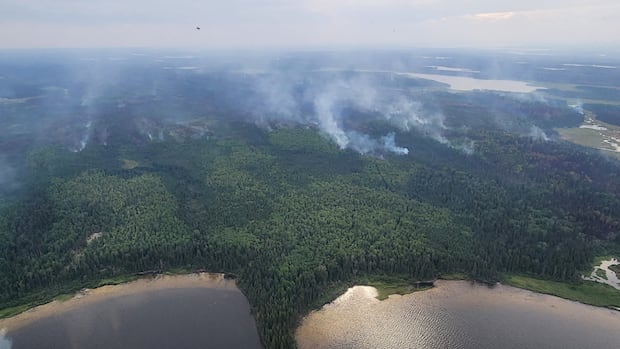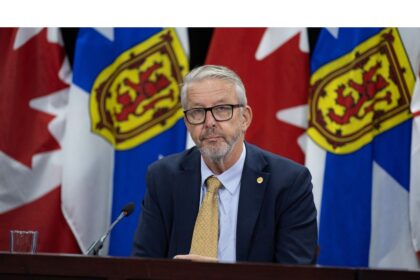ManitobaA town in northern Manitoba is restoring critical services as it prepares to bring at least 1,000 evacuees back, with cooler weather helping crews fight wildfires that forced the evacuation more than a month ago.’We came very close to losing the community,’ says mayor of northern Manitoba townA wildfire burns near the town of Snow Lake in northern Manitoba earlier this month. The blaze forced more than 1,000 residents to evacuate in July, but the town is preparing to bring them back home. (Town of Snow Lake/Facebook)A town in northern Manitoba is restoring critical services as it prepares to bring at least 1,000 evacuees back, with cooler weather helping crews fight wildfires that forced the evacuation more than a month ago.Snow Lake Mayor Ron Scott said he hopes to have a tentative return date set by next week, based on an update from Manitoba’s wildfire service on the situation.But the town is drafting a plan for the return of residents and has started some preparations, including restocking the local grocery store and pharmacy, and setting up a food bank. “We are on the downslope now. We are winning this battle,” Scott said.The largest wildfire threatening the town, about 600 kilometres northwest of Winnipeg, started in early July, and later grew and merged with another blaze, he said. As of this week, it had burned nearly 64,000 hectares.A cabin and some remote buildings were destroyed near Snow Lake, but the fire stopped just short of entering the town, says Mayor Ron Scott. (Town of Snow Lake/Facebook)Residents have been out of their homes since July 10, after the town declared a mandatory evacuation order over fears winds could drive the fire into the town.”We came very close to losing the community,” Scott said. LISTEN | Snow Lake residents head home after 6-week evacuation: Radio Noon ManitobaSnow Lake Residents Head Home After Six-Week Wildfire EvacuationSnow Lake Mayor Ron Scott speaks with CBC’s Santiago Arias Orozco about the community’s return home after six weeks away due to wildfires, preparations for residents’ arrival, the challenges of long-distance evacuations, and the impact on the local mine.A cabin and some remote buildings were destroyed, along with poles in or around Snow Lake, but the fire stopped just short of the town itself, burning just metres away from the water plant and a golf course, he said.”If I look on the fire maps, you see that there’s one little tiny blip called ‘Snow Lake’ that has survived, and everything else is surrounded by red for burned forest,” said Scott.”If we didn’t have the skill and perseverance of all the crews that were fighting that fire, it would have breached the community.… We dodged a bad one.” ‘Want to make sure that the fire is dead’Weather conditions helped spur the fire’s growth.The region is dealing with extreme drought conditions, getting less than 40 millimetres of rain since early May, Scott said. Temperatures in mid-to-high 20s and gusting winds have also fanned the flames.But cooler weather and about 17 millimetres of rain earlier this week have helped the situation, the mayor said.Manitoba’s wildfire service is sending a drone and helicopter to get thermal imaging of hot spots, and deploying more crews to tackle them. The green light for residents to return home will depend on how many of those hot spots remain, said Scott.”Once they get that number down to less than 200 and they can say, ‘OK based on our projections the community is no longer under threat,’ [then] you can start bringing people back,” Scott said. That will also depend on weather, since warmer conditions and strong winds could spur the fire again, and the town wants to avoid another evacuation after people return.Mayor Scott says cooler weather and some rain earlier this week have helped the wildfire situation in the area. (Town of Snow Lake/Facebook)That already happened once this season. An evacuation order issued for Snow Lake in early June was lifted a week later, but within a month, residents were forced out of their homes a second time.”It was a major problem. So we want to make sure that the fire is dead, that it’s not going to threaten the town,” said Scott.The plan is to allow all evacuees to return at the same time when it’s safe to do so, Scott said.International helpAccording to the province’s latest fire bulletin, issued Wednesday, the Manitoba Wildfire Service was responding to 161 active wildfires. There have been 413 fires to date this season, well above the average for this time of year of 320.A complement of 99 firefighters and two representatives from Costa Rica arrived in Canada on Thursday and are expected to be in Snow Lake by Friday evening to help crews, said Maureen Arguedas Marin, an international liaison with the National System of Conservation Areas, which is part of Costa Rica’s environment and energy ministry.The wildfire season in the Central American country peaks during March and April, leaving crews available to help abroad during the summer, she said.”For Costa Rica, it is a great honour to help,” Arguedas Marin told CBC News in Spanish.”We are very grateful for the opportunity.… This helps us grow a lot as a country, as a program and as firefighters,” she said, since Costa Rica’s firefighters are used to battling blazes in a different environment.Firefighters from Costa Rica are flying to Snow Lake, where they will help Manitoba wildfire crews fight the wildfire near the town. (Submitted by Maureen Arguedas Marin)One particular challenge is dealing with the cone-bearing trees that are more combustible, but less common in Costa Rica than in Manitoba, Arguedas Marin said. The firefighters are also not used to working around wildlife like bears, she said, noting there are security precautions in place.The contingent is relieving a group of 60 Mexican firefighters. Mayor Scott said their help was key in saving the town from the fire, but the help from Costa Rica is still needed. “They’re going to be instrumental in really nailing all of these hot spots, getting those under control … and that will speed up the process for bringing people back,” he said.Find the latest wildfire information at these sources: Canadian wildfire map Province of Manitoba fire bulletins CBC’s wildfire tracker Communities under evacuations in Manitoba Are you an evacuee who needs assistance? Contact Manitoba 211 by calling 211 from anywhere in Manitoba or email 211mb@findhelp.ca.ABOUT THE AUTHORSantiago Arias Orozco is a journalist with CBC Manitoba currently based in Winnipeg. He previously worked for CBC Toronto and the Toronto Star. You can reach him at santiago.arias.orozco@cbc.ca.
Friday, 6 Feb 2026
Canada – The Illusion
Search
Have an existing account?
Sign In
© 2022 Foxiz News Network. Ruby Design Company. All Rights Reserved.
You May also Like
- More News:
- history
- Standing Bear Network
- John Gonzalez
- ᐊᔭᐦᑊ ayahp — It happened
- Creation
- Beneath the Water
- Olympic gold medal
- Jim Thorpe
- type O blood
- the bringer of life
- Raven
- Wás’agi
- NoiseCat
- 'Sugarcane'
- The rivers still sing
- ᑲᓂᐸᐏᐟ ᒪᐢᑿ
- ᐅᑳᐤ okâw — We remember
- ᐊᓂᓈᐯᐃᐧᐣ aninâpêwin — Truth
- This is what it means to be human.
- Nokoma










